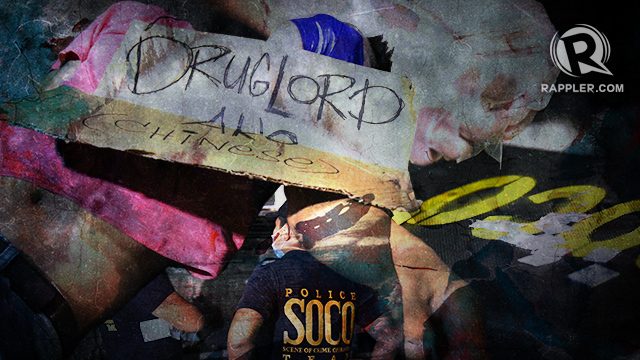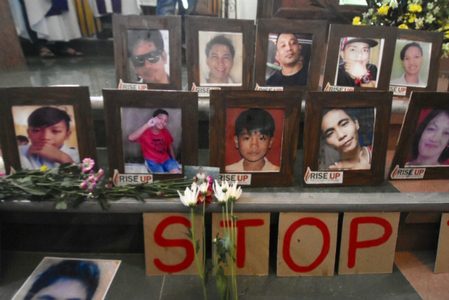SUMMARY
This is AI generated summarization, which may have errors. For context, always refer to the full article.

MANILA, Philippines – After International Criminal Court (ICC) Prosecutor Karim Khan opposed the Philippines’ appeal against the ICC probe into drug war killings in the Philippines, the ICC Office of Public Counsel for Victims stood behind Khan and asked the appeals chamber to reject the Philippines’ appeal.
“A reversal of the Impugned Decision on appeal may in fact result in halting the Prosecutor’s investigation, thereby jeopardizing the victims’ rights to truth, justice and reparations,” Paolina Massidda, the principal counsel for the victims, said.
“In fact, depending on their resolution, victims may be denied the opportunity to uncover the truth, present their views and concerns throughout the proceedings, ensure that those responsible are held accountable, and ultimately claim reparation,” she added.
“For the foregoing reasons, Counsel respectfully requests the Appeals Chamber to dismiss the Appeal in its entirety and confirm the Impugned Decision,” the principal counsel for the victims said.
The counsel from the Office of Public Counsel for Victims filed the observations “on the general interests” of the victims. According to Massidda, since the Philippines’ appeal is directed toward the whole decision, the issues raised there “fundamentally affect” the victims.
The counsel added said the office also opposed the four grounds raised by the Philippines in its appeal. Massidda said the Philippines failed to demonstrate that the pre-trial chamber committed any error in making the decision or establish a law error that “materially affected the decision.”
Pending appeal
After a pause in its investigation, the ICC moved to resume the probe centered on drug war killings under former president Rodrigo Duterte’s bloody drug war. The probe also includes killings carried out by the so-called Davao Death Squad.
The Philippines, through the Office of the Solicitor General, immediately notified the ICC in February that it would appeal the court’s decision to allow the resumption of the investigation. Later, President Ferdinand Marcos Jr.’s administration also asked the ICC to suspend the probe. Marcos is a Duterte ally.
In response, Khan sought the rejection of the Philippine government’s demand to suspend investigations. The Philippines responded in March through its appeal brief sent to the chamber, which contained its detailed arguments.
In a decision dated March 27, the ICC rejected the Philippines’ bid to suspend the ongoing investigation. The Philippines’ actual appeal opposing the probe remains pending before the international court.
Arguments
In her arguments, Massidda said the pre-trial chamber correctly found that the ICC has jurisdiction over the Philippines since the alleged crimes in question happened when the country was still a state party.
On the Philippines’ claim that the pre-trial chamber erred in deciding that the ICC has jurisdiction over the country, Massidda explained that article 12 (1) of the Rome Statute creates a legal situation, where the ICC has jurisdiction over a country, “irrespective of the actual exercise of said jurisdiction.”
The counsel also noted another principle, article 70 (1)(b) of the Vienna Convention used by the pre-trial chamber. The provision states that the ICC’s jurisdiction is not affected by a country’s withdrawal from the Rome Statute because “the termination of a treaty does not affect any right, obligation or legal situation of the parties created through the execution of the treaty prior to its termination.”
Expounding on her argument, Massidda used the ICC’s jurisprudence in Burundi, in East Africa. In its prior judgment, the ICC said that by ratifying the Rome Statute, a country accepts the ICC’s jurisdiction and this acceptance “remains unaffected by a withdrawal of the State Party from the Statute.”
Massidda noted that if a country’s acceptance of the ICC jurisdiction is determined only at the time the jurisdiction was triggered, many countries could easily evade responsibility by “notifying [their] withdrawal as soon as the Court turns its attention to crimes committed either by nationals of the State concerned or on its territory.”
In the Philippines, government data has shown that as of May 2022, at least 6,252 individuals were killed in police anti-illegal drug operations. But for human rights groups, estimates run between 27,000 and 30,000 if vigilante-style killings are included. – Rappler.com
Add a comment
How does this make you feel?

![[The Slingshot] Lito Patay’s 4 hours and 38 minutes of infamy](https://www.rappler.com/tachyon/2024/07/Lito-Patay-4-hours-infamy-July-19-2024.jpg?resize=257%2C257&crop=233px%2C0px%2C720px%2C720px)
![[The Slingshot] Alden Delvo has retired](https://www.rappler.com/tachyon/2024/05/slingshot-alden-delvo-05042024.jpg?resize=257%2C257&crop=243px%2C0px%2C720px%2C720px)
![[Rappler Investigates] It’s too darn hot!](https://www.rappler.com/tachyon/2024/05/too-darn-hot-may-2-2024.jpg?resize=257%2C257&crop=310px%2C0px%2C1080px%2C1080px)

![[The Slingshot] Alden Delvo’s birthday](https://www.rappler.com/tachyon/2024/04/tl-alden-delvo-birthday.jpg?resize=257%2C257&crop=263px%2C0px%2C720px%2C720px)



![[The Slingshot] A Duterte and Bato cop named Patay](https://www.rappler.com/tachyon/2024/06/tl-lito-patay.jpg?resize=257%2C257&crop=322px%2C0px%2C720px%2C720px)


![[Vantage Point] The PDEA leaks](https://www.rappler.com/tachyon/2024/05/vantage-point-pdea-probe.jpg?resize=257%2C257&crop=255px%2C0px%2C720px%2C720px)
![[Edgewise] How Duterte can elude ICC arrest](https://www.rappler.com/tachyon/2024/05/thought-leaders-How-Duterte-elude-icc-arrest.jpg?resize=257%2C257&crop=272px%2C0px%2C720px%2C720px)








There are no comments yet. Add your comment to start the conversation.